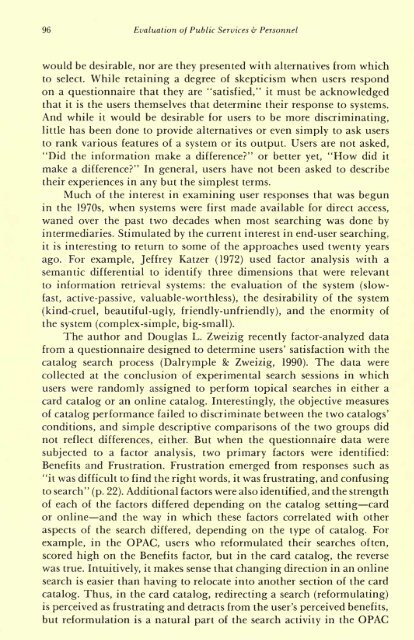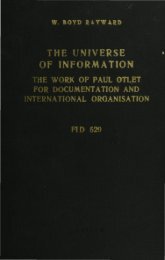User-Centered Evaluation of Information Retrieval - ideals
User-Centered Evaluation of Information Retrieval - ideals
User-Centered Evaluation of Information Retrieval - ideals
You also want an ePaper? Increase the reach of your titles
YUMPU automatically turns print PDFs into web optimized ePapers that Google loves.
96 <strong>Evaluation</strong> <strong>of</strong> Public Services 6- Personnel<br />
would be desirable, nor are they presented with alternatives from which<br />
to select. While retaining a degree <strong>of</strong> skepticism when users respond<br />
on a questionnaire that they are "satisfied," it must be acknowledged<br />
that it is the users themselves that determine their response to systems.<br />
And while it would be desirable for users to be more discriminating,<br />
little has been done to provide alternatives or even simply to ask users<br />
to rank various features <strong>of</strong> a system or its output. <strong>User</strong>s are not asked,<br />
"How did it<br />
"Did the information make a difference?" or better yet,<br />
make a difference?" In general, users have not been asked to describe<br />
their experiences in any but the simplest terms.<br />
Much <strong>of</strong> the interest in examining user responses that was begun<br />
in the 1970s, when systems were first made available for direct access,<br />
waned over the past two decades when most searching was done by<br />
intermediaries. Stimulated by the current interest in end-user searching,<br />
it is interesting to return to some <strong>of</strong> the approaches used twenty years<br />
ago. For example, Jeffrey Katzer (1972) used factor analysis with a<br />
semantic differential to identify three dimensions that were relevant<br />
to information retrieval systems: the evaluation <strong>of</strong> the system (slowfast,<br />
active-passive, valuable-worthless), the desirability <strong>of</strong> the system<br />
(kind-cruel, beautiful-ugly, friendly-unfriendly), and the enormity <strong>of</strong><br />
the system (complex-simple, big-small).<br />
The author and Douglas L. Zweizig recently factor-analyzed data<br />
from a questionnaire designed to determine users' satisfaction with the<br />
catalog search process (Dalrymple & Zweizig, 1990). The data were<br />
collected at the conclusion <strong>of</strong> experimental search sessions in which<br />
users were randomly assigned to perform topical searches in either a<br />
card catalog or an online catalog. Interestingly, the objective measures<br />
<strong>of</strong> catalog performance failed to discriminate between the two catalogs'<br />
conditions, and simple descriptive comparisons <strong>of</strong> the two groups did<br />
not reflect differences, either. But when the questionnaire data were<br />
subjected to a factor analysis, two primary factors were identified:<br />
Benefits and Frustration. Frustration emerged from responses such as<br />
"it was difficult to find the right words, it was frustrating, and confusing<br />
to search" (p. 22). Additional factors were also identified, and the strength<br />
<strong>of</strong> each <strong>of</strong> the factors differed depending on the catalog setting card<br />
or online and the way in which these factors correlated with other<br />
aspects <strong>of</strong> the search differed, depending on the type <strong>of</strong> catalog. For<br />
example, in the OPAC, users who reformulated their searches <strong>of</strong>ten,<br />
scored high on the Benefits factor, but in the card catalog, the reverse<br />
was true. Intuitively, it makes sense that changing direction in an online<br />
search is easier than having to relocate into another section <strong>of</strong> the card<br />
catalog. Thus, in the card catalog, redirecting a search (reformulating)<br />
is perceived as frustrating and detracts from the user's perceived benefits,<br />
but reformulation is<br />
a natural part <strong>of</strong> the search activity in the OPAC
















